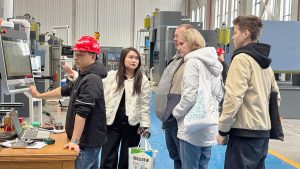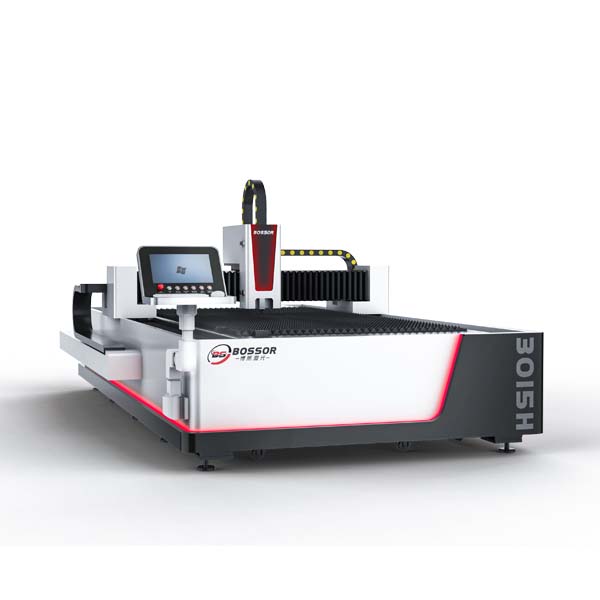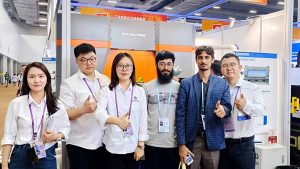
Connotation of Industry 4.0
Industry 4.0 is a concept put forward by the German government in 2011, foreseeing the imminent arrival of the fourth industrial revolution. Based on a new generation of information technology such as the Internet, Internet of Things, big data and artificial intelligence, it realizes the digitalization, networking and intelligence of the production process. The core lies in the comprehensive interconnection of people, machines and things through the information physical system (CPS), and the construction of a highly flexible production model of personalized and digitalized products and services.
In Industry 4.0, all production equipment is equipped with sensors and actuators, which are connected through wireless networks to form a huge Internet of Things (IoT). Through the IoT, production equipment can exchange information in real time, work together, and realize automated production. For example, an intelligent manufacturing system can automatically complete the entire process of order processing, production planning, production execution, and quality control without human intervention.
Meanwhile, Industry 4.0 uses big data and artificial intelligence technology to monitor and optimize the production process in real time, improving production efficiency and product quality. By collecting and analyzing the massive amount of data in the production process, the production process can be finely adjusted to improve production efficiency and product quality. The application of artificial intelligence technology will also bring more intelligence and automation to the production process, such as self-optimization and adjustment of production equipment through machine learning and deep learning technology.

Impact of Industry 4.0
Industry 4.0, a term that represents the future direction of manufacturing, is gradually changing the face of global manufacturing. It signifies that the manufacturing industry is moving into a new era of automation, completely disrupting the traditional manual manufacturing model. The impact of this change is far-reaching, not only improving production efficiency, but also bringing unprecedented opportunities for personalized production, supply chain optimization and industrial upgrading.
The wide application of Industry 4.0 technology has created tremendous benefits for enterprises.
By perfectly combining large-scale equipment such as machine tools and bending machines with intelligent and automated production lines, enterprises can realize a continuous and efficient production mode, which significantly improves production efficiency and effectively reduces manufacturing costs at the same time. This provides enterprises with a strong competitive advantage in the increasingly fierce market competition.
Industry 4.0 gives production facilities unprecedented flexibility
Under the traditional production model, manufacturers often need to produce large quantities to reduce costs. However, Industry 4.0 enables manufacturers to personalize production to the unique needs of consumers. This breakthrough meets the market's individualized pursuit of product appearance, functionality, and performance, thus enhancing product competitiveness in the market.
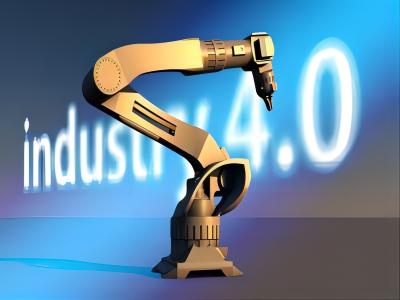
Industry 4.0 has revolutionized supply chain management
With the Internet of Things and big data technology, enterprises can monitor and optimize the supply chain in real time, realizing the whole visualization management from raw material procurement to product delivery. This provides enterprises with more flexible resilience, enabling them to respond quickly to market changes and improving the efficiency and responsiveness of the supply chain. In the field of logistics, the application of IoT technology monitors logistics information in real time and optimizes processes, thus improving logistics efficiency and accuracy. With the continuous progress of technology, the manufacturing industry is changing from a low-cost, low-value-added production model to a high-cost, high-value-added direction. Especially in the field of high-end equipment manufacturing, Industry 4.0 has significantly improved product quality and technology level and enhanced overall competitiveness through intelligent and refined production processes.
Industry 4.0 also brings certain employment challenges
With the popularization of intelligent equipment and systems, some traditional jobs may be replaced by automated production lines. But at the same time, Industry 4.0 also creates new employment opportunities. With the popularization of smart devices and systems, the demand for talents in related fields continues to grow. In addition, Industry 4.0 will also promote advances in the field of education and training, cultivating more talents with specialized skills to adapt to the development of emerging technologies.
Despite the numerous advantages brought by Industry 4.0, there are still challenges in combining it with special equipment such as bending machines. How to realize the perfect integration of intelligent equipment with traditional processes and fully utilize the potential of Industry 4.0 is an urgent issue that needs to be addressed today. This requires close cooperation between manufacturers and technology providers to jointly explore Industry 4.0 solutions for the bending machine sector.
In conclusion, the impact of Industry 4.0 cannot be ignored. It not only improves production efficiency, meets individualized demand, optimizes supply chain management, promotes industrial upgrading, and creates employment opportunities, but also brings new development opportunities and challenges for the manufacturing industry. In order to better adapt to this change, enterprises need to actively embrace new technologies, strengthen talent training and technological innovation to achieve sustainable development and long-term competitive advantage.
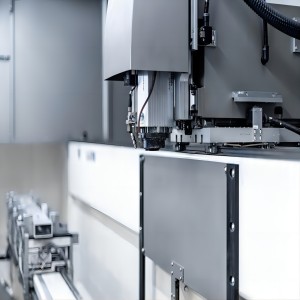
Intelligent Control System
Intelligent control systems have diverse characteristics, the following is an introduction to the company's use of intelligent control systems.
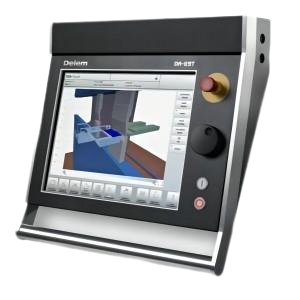
DELEM Control System
DELEM DA-53T, for example, has a 10.1-inch high-resolution color TFT screen, unique "hot key" touch navigation, support for up to 4-axis (Y1, Y2 + 2 auxiliary axis) control. The system has a built-in tool/material/product library and advanced Y-axis control algorithms ensure efficient control of closed and open loop valves. Equipped with CNC compensated control and USB memory stick interface for easy data transfer. Equipped with Profile-53TL offline software, allowing users to program and simulate offline.
B&R Automation Studio
The emerging B&R Automation Studio is a platform developed by B&R, a professional industrial automation company, which supports the development of multiple control systems.
With B&R Automation Studio, bending machines can be easily integrated into the Industry 4.0 ecosystem for intelligent manufacturing. Different intelligent control systems are utilized in the production of bending machines with different needs, increasing productivity.
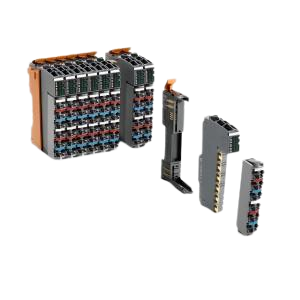
Cybelec Control System
Cybelec is another leading CNC manufacturer with control systems that are also capable of integrating with the Industry 4.0 platform. Take the CybTouch 8 PS, for example, which is part of the CybTouch family designed for synchronized pressing. Features include an intuitive and vibrant 7-inch color graphic CRT screen, manual sequential 2D graphic contour creation, up to 4-axis (Y1, Y2 + 2-axis) control, bending coefficients and pressure compensation calculations. In addition, CNC compensation control, angle and backstop correction are available. The product also comes with PC1200 offline software, providing users with more flexibility in program editing and simulation.CybTouch 8 PS provides efficient and accurate control of the simultaneous pressing process through highly integrated features and intuitive operation, allowing for easier operation and more accurate production.
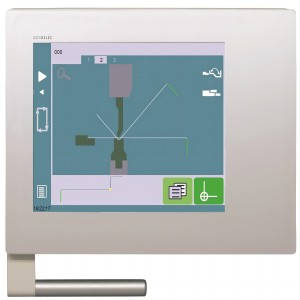
ESA Control System
The representative product is the ESA S630, a 2D graphic CNC control with the most powerful 10-inch touch screen in its class, equipped with high-performance graphics and offering complete functionality for top-quality machines. Economical, user-friendly features include a 10-inch LCD touch screen, manual sequencing for touch-enabled 2D graphic creation, 4-axis support (Y1Y2,X,R), automatic calculation of bending forces and compensation, modular tooling for use with each part or bend, direct angle correction and compensation calculations, and integrated proportional and pressure valve amplifiers. Free PC offline simulation software is also available to support dual machine linkage management (optional) and Modbus TCP interface for SCADA or MES (optional).
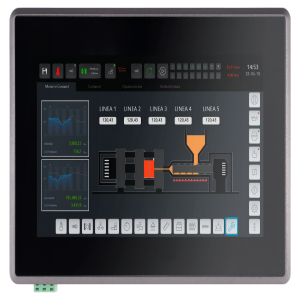
IoT Sensor Applications
Various sensors, such as pressure sensors and temperature sensors, are installed on the bending machine to monitor the working status of the equipment and environmental conditions in real time. These sensors can collect large amounts of data that can be used for predictive maintenance and reduce machine downtime. By connecting with an Internet of Things (IoT) platform, the bending machine realizes a tight link to the cloud to support remote monitoring, big data analysis and predictive maintenance. With well-known IoT platforms such as Microsoft Azure IoT and IBM Watson IoT, a reliable infrastructure is provided to bring smarter and more efficient production management to the bending machine. This advanced connectivity technology not only improves the real-time and transparency of the production process, but also provides strong support for equipment maintenance and performance optimization, making the bending machine more competitive in digital manufacturing.
Collaborative Robotics Applications
The application of cobots will revolutionize the bending machine production line, realizing the collaboration between robots and human beings to complete bending tasks. The use of advanced sensors and artificial intelligence technology to ensure safe collaboration between robots and humans not only improves the flexibility and efficiency of the production line, but also creates a more productive work environment. This advanced model of collaboration not only simplifies the complex bending process, but also provides employees with more creative tasks. The introduction of collaborative robots is not only a leap forward in production line automation, but also realizes the perfect integration of man and machine, bringing a new production paradigm to the manufacturing industry. At the same time, it also advances the impact of the employment problem described in the previous section, and the mass application of robots will surely bring about a wave of layoffs of traditional workers, generating new social problems.
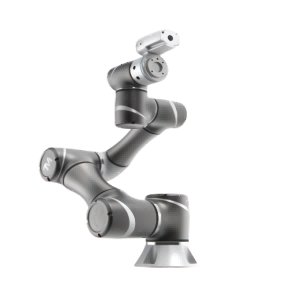
Summarizing
Industry 4.0, as a representative of the fourth industrial revolution, is triggering an industrial revolution worldwide. Its unique way of changing the traditional manufacturing industry, integrating intelligence, automation and networking into the production process, opens up a new path for global industrial development. Our company will continue to meet the challenge of integrating Industry 4.0 with our own business to increase production capacity and improve product quality.
Quiénes somos
Durmapress se especializa en el diseño, la fabricación y la venta de diversos equipos de procesamiento de metales, como plegadoras, cizallas, punzonadoras, máquinas de corte por láser, etc. La empresa se fundó en 2000. Con años de experiencia y acumulación de tecnología. DurmaPress se ha convertido en una de las marcas más conocidas de la industria china de maquinaria para el procesamiento de metales.
Póngase en contacto con nosotros
Entradas recientes
Categorías
Síguenos
Nuevo vídeo semanal
Más información
Si tiene alguna información sobre nuestros productos, póngase en contacto con nosotros y le responderemos en 24 horas.

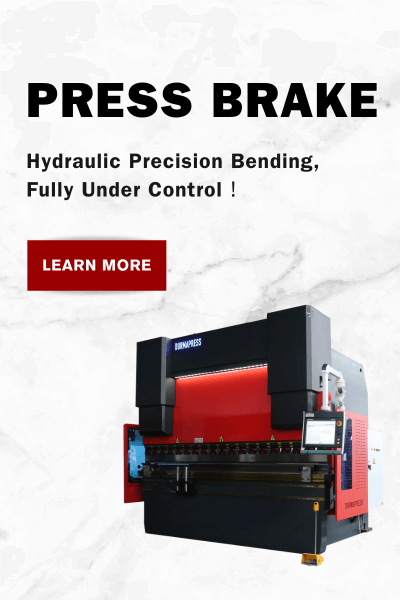

-300x169.jpg)
